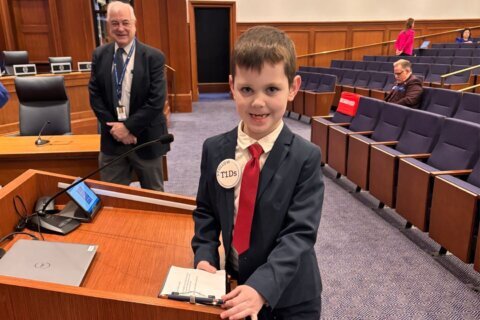With the nation again embroiled in a debate over police reform after the killing of George Floyd in Minneapolis, Northern Virginia prosecutors are looking for ways to strike out Confederate-era laws and legal customs as they work to dismantle systemic racism.
Elected Commonwealth’s Attorneys from Arlington, Fairfax, Loudoun, Prince William and Stafford counties, and the City of Alexandria — four of whom are first-term Democrats — detailed to WTOP how vestiges of Virginia’s past as the core of the Confederacy have been embedded in the legal system for decades.
Where’s the video?
On Memorial Day, Minneapolis Police Department officer Derek Chauvin pinned his knee on George Floyd’s neck for 8 minutes and 46 seconds. Smartphone video meticulously documented his death, as he was cuffed and pressed to the asphalt outside a convenience store.
Through a combination of surveillance, body camera and bystander video, the final moments of Floyd’s life would be rebroadcast around the world to millions. It would trigger a wave of outrage over police brutality not seen in American society for years, perhaps decades — despite only being the latest in a long installment of Black men dying at the hands of law enforcement.
Inside government buildings and courthouses, decisions of prosecutors are not as easily documented.
“We don’t face the same kind of scrutiny, there’s no cameras recording what we do,” said Parisa Dehgani-Tafti, a Democrat serving her first term as Commonwealth’s Attorney for Arlington County and the City of Falls Church.
Even before the Civil War, Dehgani-Tafti said, Virginia state law has treated people of color differently than whites.
“In 1848, (Virginia) passed a law that said a Black person, whether they were a slave or free, could receive the death penalty for any offense that would otherwise be punishable by three years or more, if committed by a white person,” she said.
“We baked into our law a racial disparity.”
Black and white Virginians were incarcerated at roughly equal rates before the Civil War, Dehgani-Tafti said. But the disparity grew after the collapse of the Confederacy with new laws that disproportionately affected people of color.
“By 1880, it was 7% higher for Blacks; 10% higher by 1890, 20% higher by the 1920s and 30s, and up to 40% higher into the modern era,” citing figures based on the U.S. Census.
Dehgani-Tafti wants to eliminate the practice of requiring cash bond, before trial, saying it unfairly penalizes poor people.
“I shouldn’t be treated differently than you just because you have the money to buy your way out of jail and I don’t,” she said.
In addition to the short-term discomfort of remaining behind bars until trial, Dehgani-Tafti said the results are often long-lasting.
“If they’re in jail, and can’t buy their way out, sometimes the only way they see out is by pleading guilty to something, whether or not people are guilty,” she said.
In Virginia, a person who is found guilty of a felony is stripped of several civil rights, including the right to vote, hold public office, serve on juries, or own a firearm.
Virginia ‘justice’
In 2002, the U.S. Justice Department chose to have 17-year-old D.C. Sniper suspect Lee Boyd Malvo tried first in Fairfax County, where Attorney General John Ashcroft believed Malvo had the best chance of receiving the death penalty.
After Malvo was convicted of the murder of FBI analyst Linda Franklin, then-prosecutor Robert Horan asked the jury to sentence him to death.
Malvo, who is Black, was ultimately sentenced to life in prison with no chance of parole.
“It’s very ironic because I don’t think anyone would view Fairfax County anymore as the most punitive place around,” said Fairfax Commonwealth’s Attorney Steve Descano, a first-term Democrat.
In 2005, the U.S. Supreme Court ruled that executing people who were minors at the time of their crimes was unconstitutional.
Descano defeated longtime prosecutor Ray Morrogh, a Democrat, in the 2019 primary. Morrogh ended up endorsing an independent, rather than Descano.
“The core obligation of a prosecutor is both to the law, and to the community it’s meant to serve,” Descano said.
As Fairfax County continues to diversify, Police Chief Ed Roessler is working to ensure colorblind policing, after an internal report found police disproportionately use force on Black people.
According to police numbers, while Black people make up less than 10% of the county’s population, they are involved in almost half of all police use-of-force incidents.
“That’s why we’re trying to put a push on categorizing and collecting data because that’s going to show us where our best areas of opportunity to root out systemic discrimination lie,” Descano said.
“Quite frankly, it shouldn’t take people out in the street for leaders to be looking to constantly be ahead of the curve, in trying to build a more fair justice system, every day.”
System isn’t broken
“When you think about how prosecutor’s offices have traditionally focused, it has been with the sole eye on punishment,” said Loudoun County Commonwealth’s Attorney Buta Bijberaj.
First-time Democratic prosecutor Biberaj serves a large jurisdiction, ranging from the diverse and tech-based Sterling and Dulles, to the more rural Bluemont and Purcellville.
Within the last few years, Biberaj said she has come to the disappointing conclusion that much of Virginia’s legal system is working as intended — because it was founded to uphold the institution of slavery.
“The system is not broken — it’s doing exactly what it was intended to do,” Biberaj said.
For instance, Biberaj contrasts the inequities between crimes and sentences, based upon whether or not a person is poor.
“In the U.S., when you steal hundreds of millions of dollars, that’s a huge impact on the community. Stealing $60 or $70, it’s going to impact somebody, but it’s not going to have that vast impact,” she said.
“So, if we’re using the criminal justice system to squash somebody and keep them down in that situation, we have to start looking at why.”
Does jail equal justice?
One of two incumbent prosecutors in Northern Virginia, Alexandria Commonwealth’s Attorney Bryan Porter, a Democrat, believes local prosecutors are making progress.
“It’s been slow and sometimes glacial,” Porter said, observing “some changes” in the 19 years since he became a prosecutor leading up to his election in 2013.
“There was never any conversation in prosecutorial circles about implicit bias or racial disparities. It was never something that was discussed with me by my chain of command. It was never something that we talked about at conferences. It was nothing that we had training on,” Porter said.
U.S. Census data from 2010 shows Blacks are incarcerated five times more often than whites in Virginia.
“You can’t really turn away from those cold, hard numbers,” Porter said. “They paint a pretty convincing picture that we have an issue that we need to address.”
Porter said in the years since he has been Commonwealth’s Attorney, his office has reduced the number of felony indictments brought to the grand jury each year.
In charging discussions with assistant prosecutors, he encourages them to be “really, really selective and thoughtful about whether we need to seek a felony disposition — in many cases the answer is no, and we’re able to dispose of it as a misdemeanor.”
He acknowledges “in some cases we have to be zealous in our prosecution,” but suggests those are generally crimes of violence.
“You’re talking about shooting people, armed robbery, murder.”
Asked if his willingness to resolve cases without a long jail sentence deprives the community of justice, Porter said it doesn’t.
“If we can get a person some services, and not create a new felon who will forever be branded when they have to apply for jobs, education, or housing, in my opinion that’s a more just result than just blindly seeking a felony conviction and just moving on to the next case,” Porter said.
Laws lag behind reform
In the Northern Virginia region, the longest-serving incumbent prosecutor is also the sole Republican — Eric Olsen has been the Stafford County Commonwealth’s Attorney for nine years.
“Citizens want to be safe, and they rely on the police and prosecutor to do everything they can to make them safe,” Olsen said. “But that does not necessarily mean a knee-jerk reaction to lock everybody up that’s charged with a crime.”
Olsen said by the time a case reaches his office, “we typically do not recommend any sort of cash bail.”
However, Olsen said statutes remain on the books, which make it likely a person who was just arrested will be held — at least temporarily — and have to pay to get out.
“There are statutes, laws in Virginia that require the magistrate to set a cash or secured bond, as opposed to a personal recognizance bond, depending on the nature of the offense, the defendant’s record, his status, and that sort of thing,” Olsen said. “So, even with offices that have gotten away from cash bail largely, like mine, there are still some kinds of institutional problems that require setting a cash bond, at least in the initial stage.”
Stafford County is approximately 70% white, and 20% Black.
“People that look like us, and feel like us, and are like us, we tend to gravitate more toward or associate with more, or understand more,” said Olsen, but that poses a potential risk for prosecutors.
Olsen offered an example: “The kid that was in college and commits an offense, gets a break, because the prosecutor went to college and said ‘There but for the grace of God go I, and that was a youthful mistake.’ Well, are you considering it a youthful mistake for a person that’s not in college, or the person that doesn’t look like you?”
Reflecting the community
One of the fastest-growing counties in Northern Virginia had something that didn’t change for more than a half-century — its prosecutor.
Prince William County Commonwealth’s Attorney Amy Ashworth, a Democrat, is in her first term after the retirement of Paul Ebert, who sent more people to Virginia’s death row than any prosecutor in the history of the commonwealth.
“When you have an office that doesn’t have a change of leadership in 52 years, there’s a lot of stale and old practices that need to be changed,” Ashworth said.
Ashworth, who served as a prosecutor for a period under Ebert, said when she took office most of the prosecutors were white, in the diverse county.
Portions of Prince William County, largely on the eastern side, have a median household income of approximately $54,000. Some areas in the western portion of the county have median incomes above $150,000.
“One of the first things I did was change the hiring system, and made it less of ‘you can get a job here if you know somebody,’ to more broad advertising and recruiting from the minority bar associations, to try to have a more diverse prosecutor base,” Ashworth said.
In attempting to increase her office’s connection with the community, she looks past where the candidate went to college, law school and the grades they attained: “What is this person’s connection to our community — do they have something else they can share?”
Ashworth believes having a diverse staff of prosecutors will lead to more informed charging decisions.
“You can walk down the hall, step into your colleague’s office and say ‘What do you think about that?’ And, if your colleagues have the same experience as you and look like you, you’re not getting a broad approach to these cases,” Ashworth said.
Bottom line: Ashworth said working to reduce systemic racism in police departments and prosecutors’ offices will improve lives in Northern Virginia.
“The better the criminal justice system is, the more faith people have that when a crime is committed against them, they don’t have to go out and fix the wrongs themselves — they can rely on the criminal justice system to right the wrong.”








